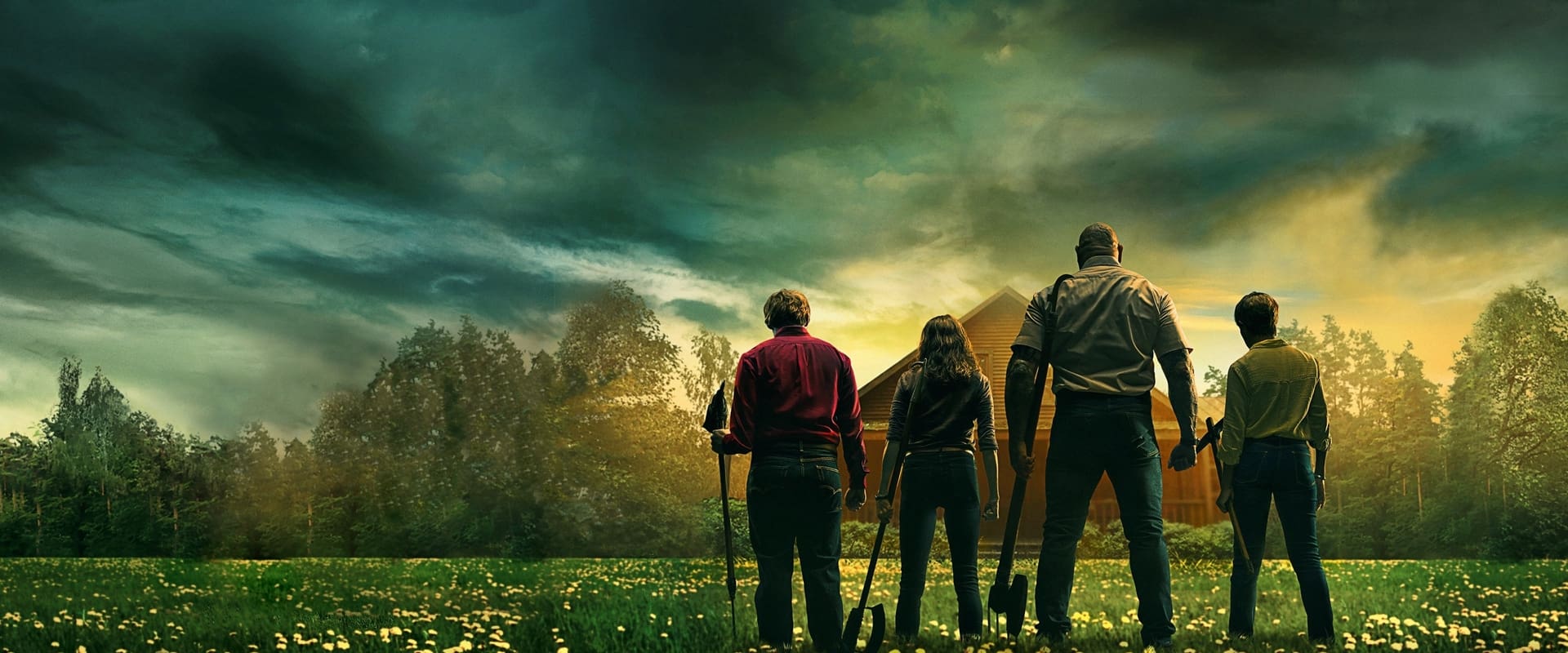Why is it that M. Night Shyamalan, who once roped us in with dead people whispering in the suburbs and left us breathless with a simple color-red, now insists on leading us into suspense-free rooms where the walls seem made of cardboard and the only thing at stake is your patience? Knock at the Cabin (2023) is his latest parlor trick gone flat—a film that opens the curtain on big, end-of-the-world parables only to serve up a dish that’s tepid, tidy, and quietly deflating.
The premise should have been a knockout: an adoptive family (Jonathan Groff and Ben Aldridge, both trembling with believable love, if not believable decision-making, and their daughter, sharply alert Kristen Cui) on vacation, sequestered by four strangers whose mixture of gentleness and menace should have us clutching armrests. Dave Bautista, lumbering in like a man who’s read far too many self-help books about empathy, leads a quartet of intruders with the claim that the fate of humanity depends on a most unspeakable sacrifice. But before a single drop of existential dread can pool on the floorboards, Shyamalan has drained all the mystery out of the setup—the suspense plays out with the inevitability of a slot machine that only gives you lemons.
Bautista deserves more than this. He’s a revelation in restrained muscle and soft apology—a brute with bedroom eyes and a kindergarten teacher’s tone. In a better film, that contradiction would ping-pong between terror and tenderness. Here, it gets lost beneath chatter so overwrought and mechanical you wince for the actors. Everyone on screen is forced to spell out their dilemmas like contestants in a moral spelling bee—one that spells out “sacrifice” before we’ve even cared enough to want to play.
The film nudges at big-ticket themes: Would you destroy your joy to save the world? Are we all just straw in the apocalyptic wind? But Shyamalan, tugging shyly at depth, delivers only the surface tension—sacrifices are pondered, but rarely felt. There was a time when his movies left us arguing in the parking lot afterward, but this time the only post-film question is “Do you still want popcorn?”
Isolated in a gloomily-lit, generically menacing cabin, the visual palette aspires to claustrophobia but lands squarely in cliché. The camera roves, the windows shudder, and then we get external apocalypse vignettes delivered via television—the kind of “global chaos” that feels more like a screensaver gone awry than mankind’s last stand. When horror tries to sneak in, it’s so awkwardly staged and half-hearted that it ends up producing a giggle, not a gasp.
As for Shyamalan’s ear for dialogue, once so quirky and recognizably human, there’s nothing left but smooth, airless exchanges, the kind screenwriting students are taught to avoid. Emotional truth gets replaced by the kind of stilted gravitas you hear in insurance commercials.
Worse still, the film shuffles toward a non-ending, refusing to risk the twist or ambiguity that defined Shyamalan’s best. No frissons of uncertainty, no reversals to toss in your mind at midnight—just a plodding, ponderous journey from A to B. Even basic logic gets sacrificed along the way (the gun mechanics alone could spark a drinking game for plot holes).
And yet, the cast tries gamely to sell it: Groff and Aldridge’s panic is at least corporeal, and Bautista, again, manages grace notes of menace and tenderness. But noble performances cannot rescue a project built on sand.
"Knock at the Cabin" is the movie equivalent of asking someone, “What would you do if you had one day to live?”—and then insisting they explain their answer in a monotone. Shyamalan used to know how to twist the knife; now, he barely scratches the surface. The apocalypse may knock, but you might just wish you didn’t answer the door.


